
Electronics manufacturing services company Sanmina (NASDAQ:SANM) reported Q3 CY2024 results exceeding the market’s revenue expectations, but sales fell 1.7% year on year to $2.02 billion. On the other hand, the company expects next quarter’s revenue to be around $1.98 billion, slightly below analysts’ estimates. Its GAAP profit of $1.09 per share was in line with analysts’ consensus estimates.
Is now the time to buy Sanmina? Find out by accessing our full research report, it’s free.
Sanmina (SANM) Q3 CY2024 Highlights:
- Revenue: $2.02 billion vs analyst estimates of $1.96 billion (2.9% beat)
- EPS (GAAP): $1.09 vs analyst expectations of $1.10 (in line)
- Revenue Guidance for Q4 CY2024 is $1.98 billion at the midpoint, below analyst estimates of $1.99 billion
- Gross Margin (GAAP): 8.5%, in line with the same quarter last year
- Operating Margin: 4.4%, in line with the same quarter last year
- Free Cash Flow Margin: 1.5%, similar to the same quarter last year
- Market Capitalization: $3.90 billion
"We finished the year with solid momentum. Our fourth quarter revenue was up 9.6 percent sequentially, and non-GAAP diluted earnings per share was up 14.3 percent over the prior quarter and exceeded our outlook. We saw growth in the majority of our end-markets, primarily with strength from the communications networks and cloud infrastructure," stated Jure Sola, Chairman and Chief Executive Officer of Sanmina Corporation.
Company Overview
Founded in 1980, Sanmina (NASDAQ:SANM) is an electronics manufacturing services company offering end-to-end solutions for various industries.
Electrical Systems
Like many equipment and component manufacturers, electrical systems companies are buoyed by secular trends such as connectivity and industrial automation. More specific pockets of strong demand include Internet of Things (IoT) connectivity and the 5G telecom upgrade cycle, which can benefit companies whose cables and conduits fit those needs. But like the broader industrials sector, these companies are also at the whim of economic cycles. Interest rates, for example, can greatly impact projects that drive demand for these products.
Sales Growth
A company’s long-term performance is an indicator of its overall business quality. While any business can experience short-term success, top-performing ones enjoy sustained growth for multiple years. Sanmina’s demand was weak over the last five years as its sales fell by 1.2% annually, a rough starting point for our analysis.
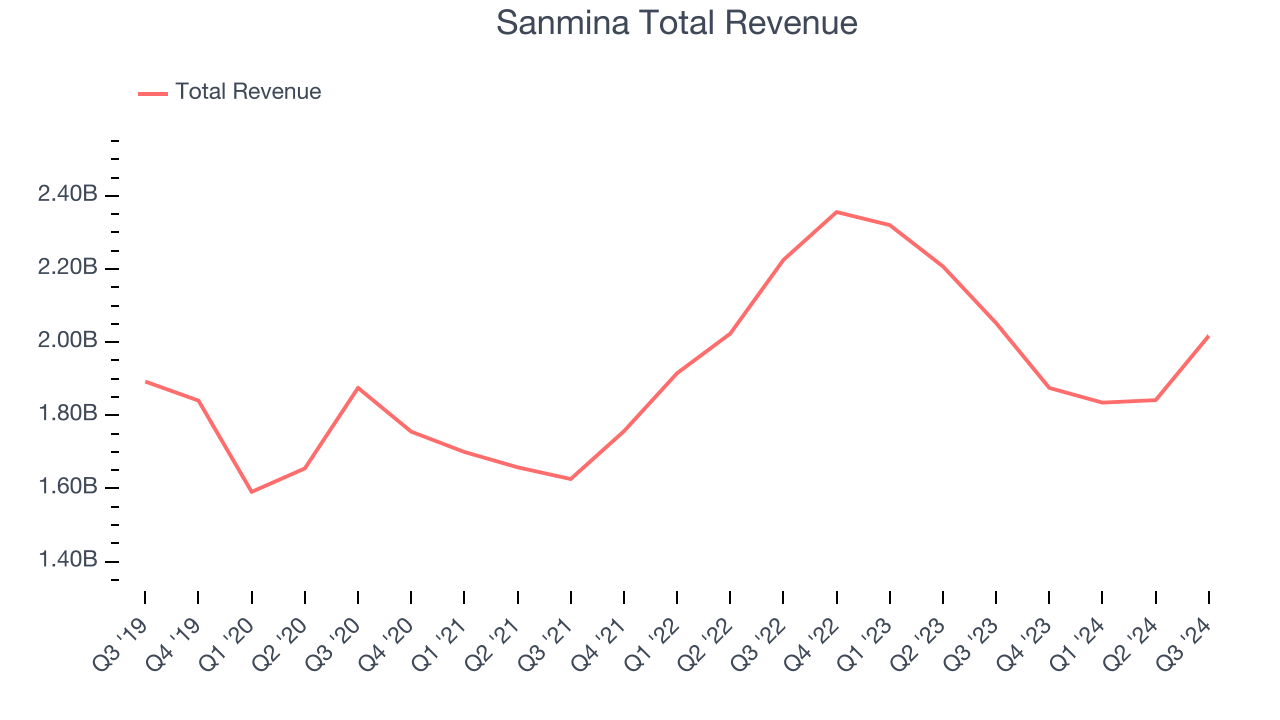
Long-term growth is the most important, but within industrials, a half-decade historical view may miss new industry trends or demand cycles. Sanmina’s recent history shows its demand has stayed suppressed as its revenue has declined by 2.2% annually over the last two years. Sanmina isn’t alone in its struggles as the Electrical Systems industry experienced a cyclical downturn, with many similar businesses seeing lower sales at this time. 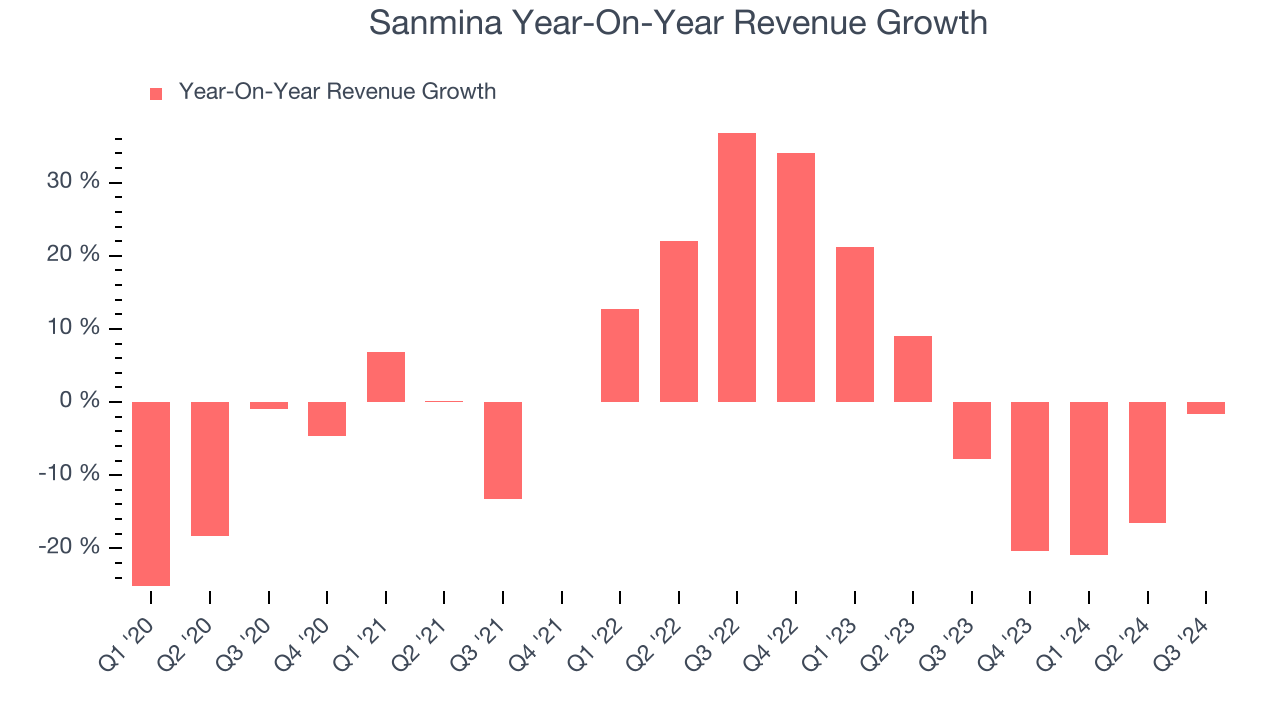
This quarter, Sanmina’s revenue fell 1.7% year on year to $2.02 billion but beat Wall Street’s estimates by 2.9%. Management is currently guiding for a 5.3% year-on-year increase next quarter.
Looking further ahead, sell-side analysts expect revenue to grow 8.9% over the next 12 months, an improvement versus the last two years. This projection is above average for the sector and indicates the market believes its newer products and services will spur faster growth.
Today’s young investors won’t have read the timeless lessons in Gorilla Game: Picking Winners In High Technology because it was written more than 20 years ago when Microsoft and Apple were first establishing their supremacy. But if we apply the same principles, then enterprise software stocks leveraging their own generative AI capabilities may well be the Gorillas of the future. So, in that spirit, we are excited to present our Special Free Report on a profitable, fast-growing enterprise software stock that is already riding the automation wave and looking to catch the generative AI next.
Operating Margin
Operating margin is one of the best measures of profitability because it tells us how much money a company takes home after procuring and manufacturing its products, marketing and selling them, and, most importantly, keeping them relevant through research and development.
Sanmina was profitable over the last five years but held back by its large cost base. Its average operating margin of 4.4% was weak for an industrials business. This result isn’t too surprising given its low gross margin as a starting point.
Looking at the trend in its profitability, Sanmina’s annual operating margin might have seen some fluctuations but has generally stayed the same over the last five years, which doesn’t help its cause.
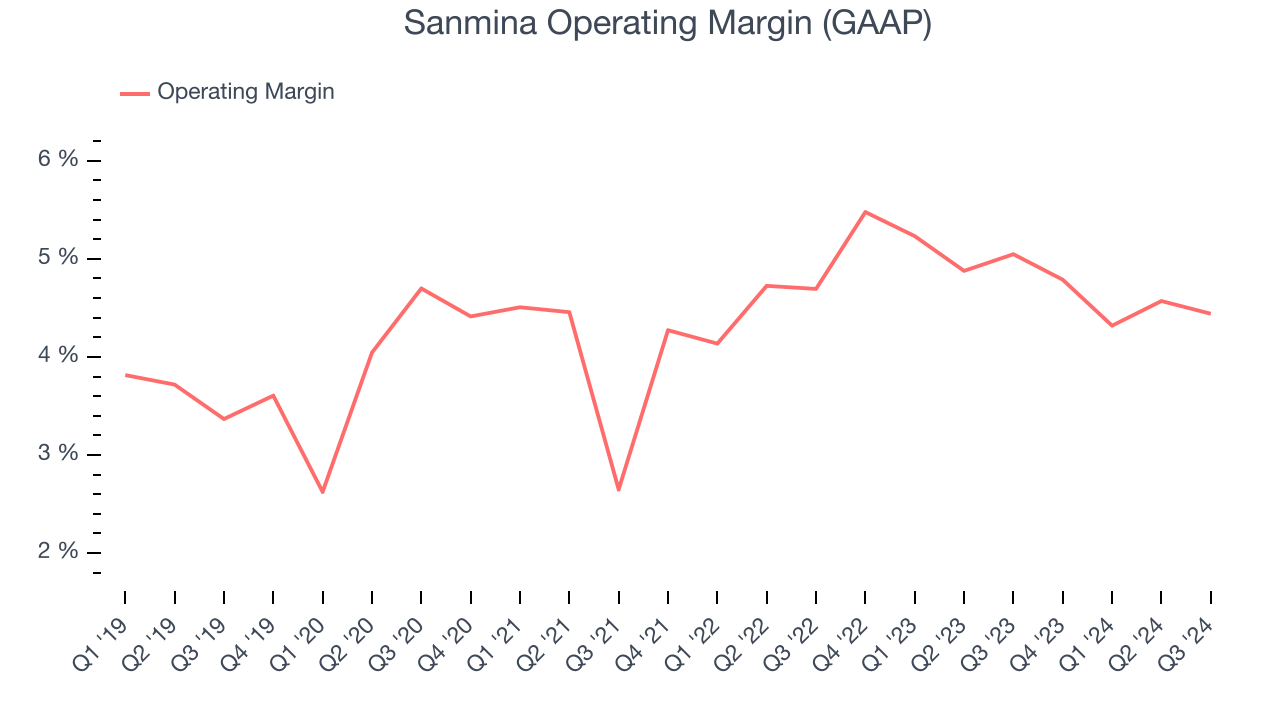
This quarter, Sanmina generated an operating profit margin of 4.4%, in line with the same quarter last year. This indicates the company’s cost structure has recently been stable.
Earnings Per Share
Analyzing revenue trends tells us about a company’s historical growth, but the long-term change in its earnings per share (EPS) points to the profitability of that growth – for example, a company could inflate its sales through excessive spending on advertising and promotions.
Sanmina’s EPS grew at a spectacular 15.2% compounded annual growth rate over the last five years, higher than its 1.2% annualized revenue declines. However, this alone doesn’t tell us much about its business quality because its operating margin didn’t expand.
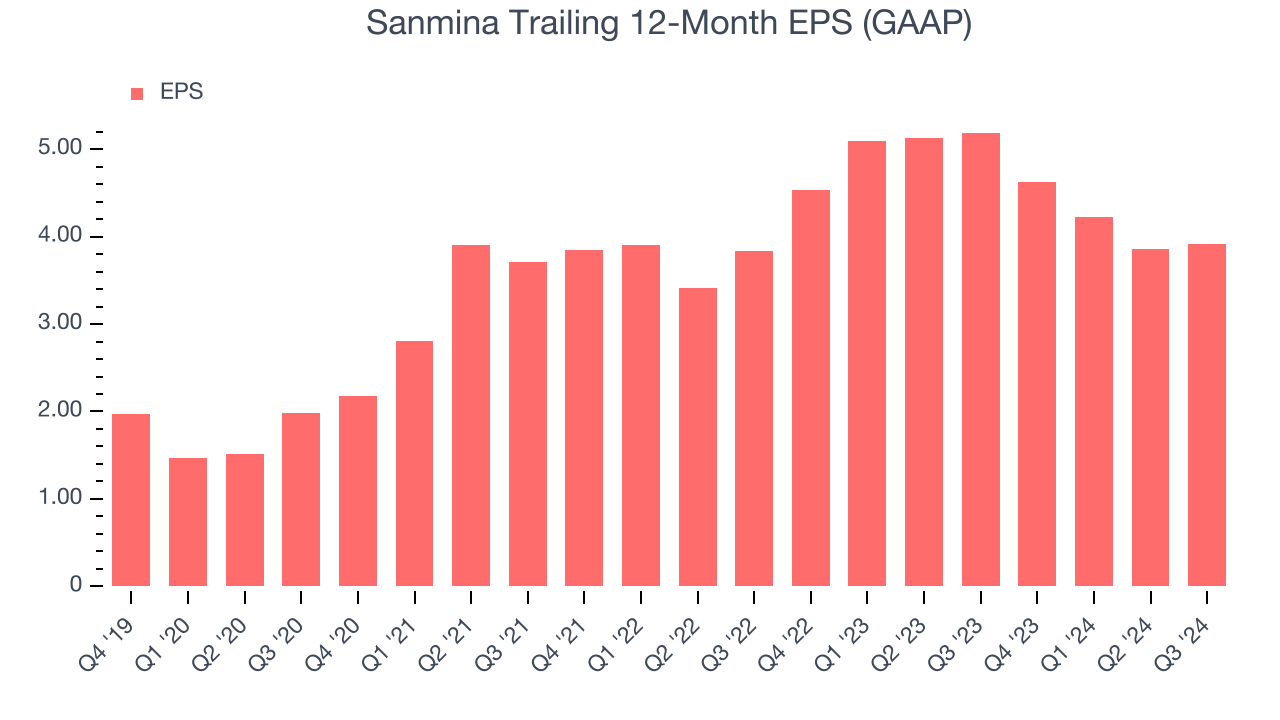
Diving into Sanmina’s quality of earnings can give us a better understanding of its performance. A five-year view shows that Sanmina has repurchased its stock, shrinking its share count by 22.2%. This tells us its EPS outperformed its revenue not because of increased operational efficiency but financial engineering, as buybacks boost per share earnings. 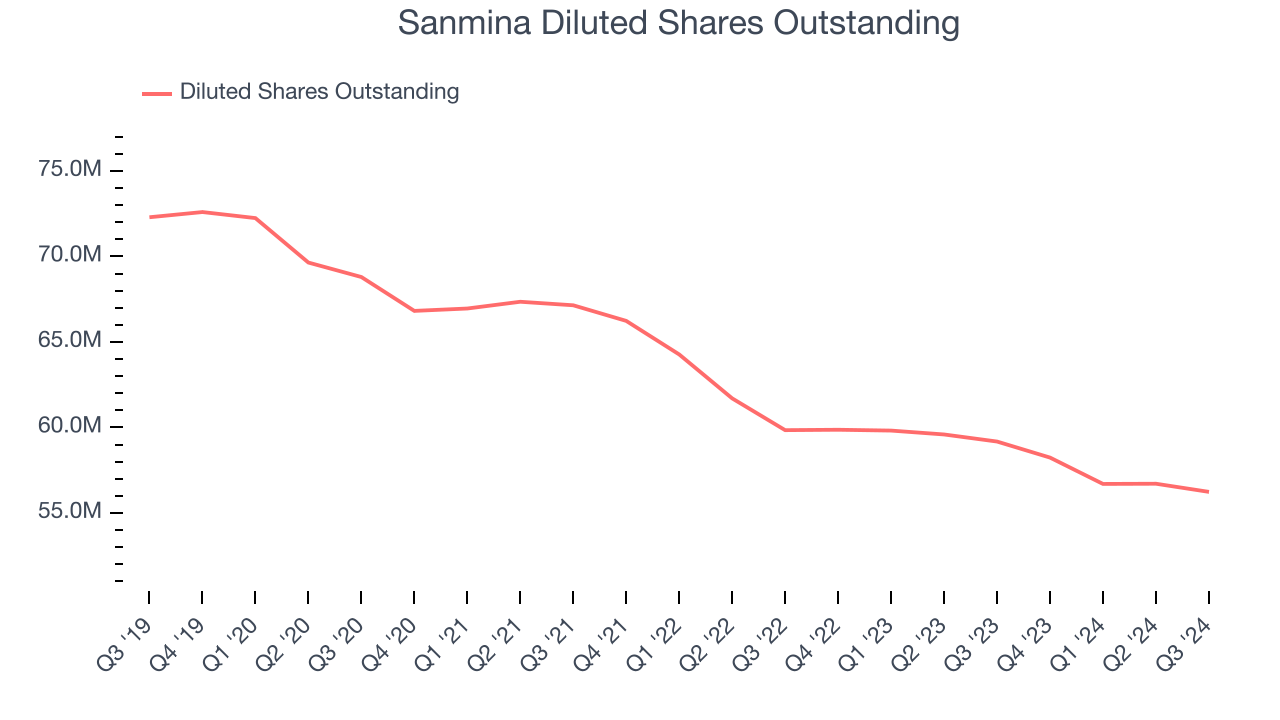
Like with revenue, we analyze EPS over a shorter period to see if we are missing a change in the business.
For Sanmina, EPS didn’t budge over the last two years, a regression from its five-year trend. We hope it can revert to earnings growth in the coming years.In Q3, Sanmina reported EPS at $1.09, up from $1.04 in the same quarter last year. This print was close to analysts’ estimates. Over the next 12 months, Wall Street expects Sanmina’s full-year EPS of $3.91 to grow by 27.9%.
Key Takeaways from Sanmina’s Q3 Results
We were impressed by how significantly Sanmina blew past analysts’ revenue expectations this quarter. On the other hand, its EPS missed and its revenue guidance for next quarter came in slightly below Wall Street’s estimates. Overall, this quarter was mixed. The stock remained flat at $72.56 immediately after reporting.
Is Sanmina an attractive investment opportunity at the current price? We think that the latest quarter is only one piece of the longer-term business quality puzzle. Quality, when combined with valuation, can help determine if the stock is a buy. We cover that in our actionable full research report which you can read here, it’s free.













